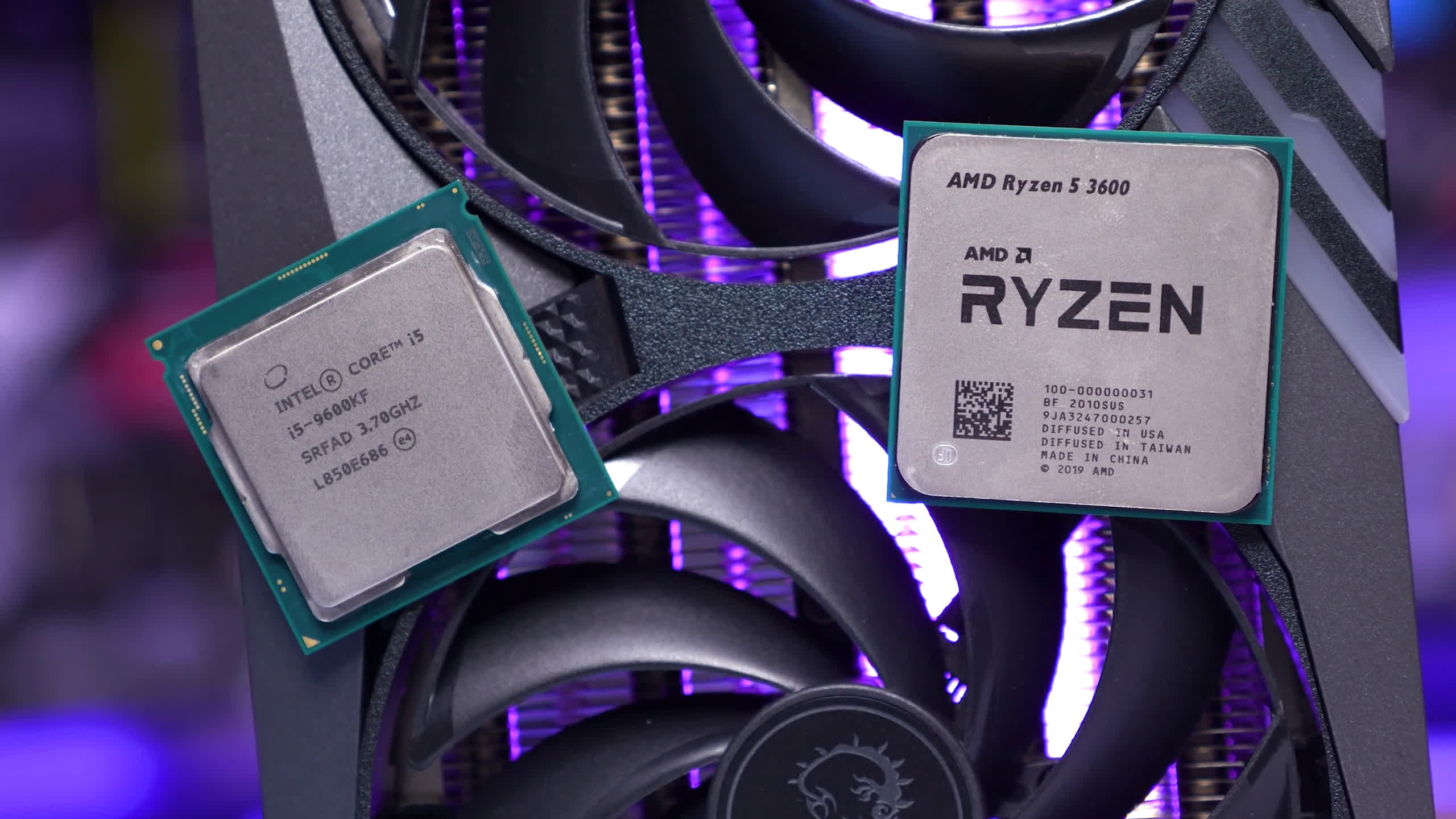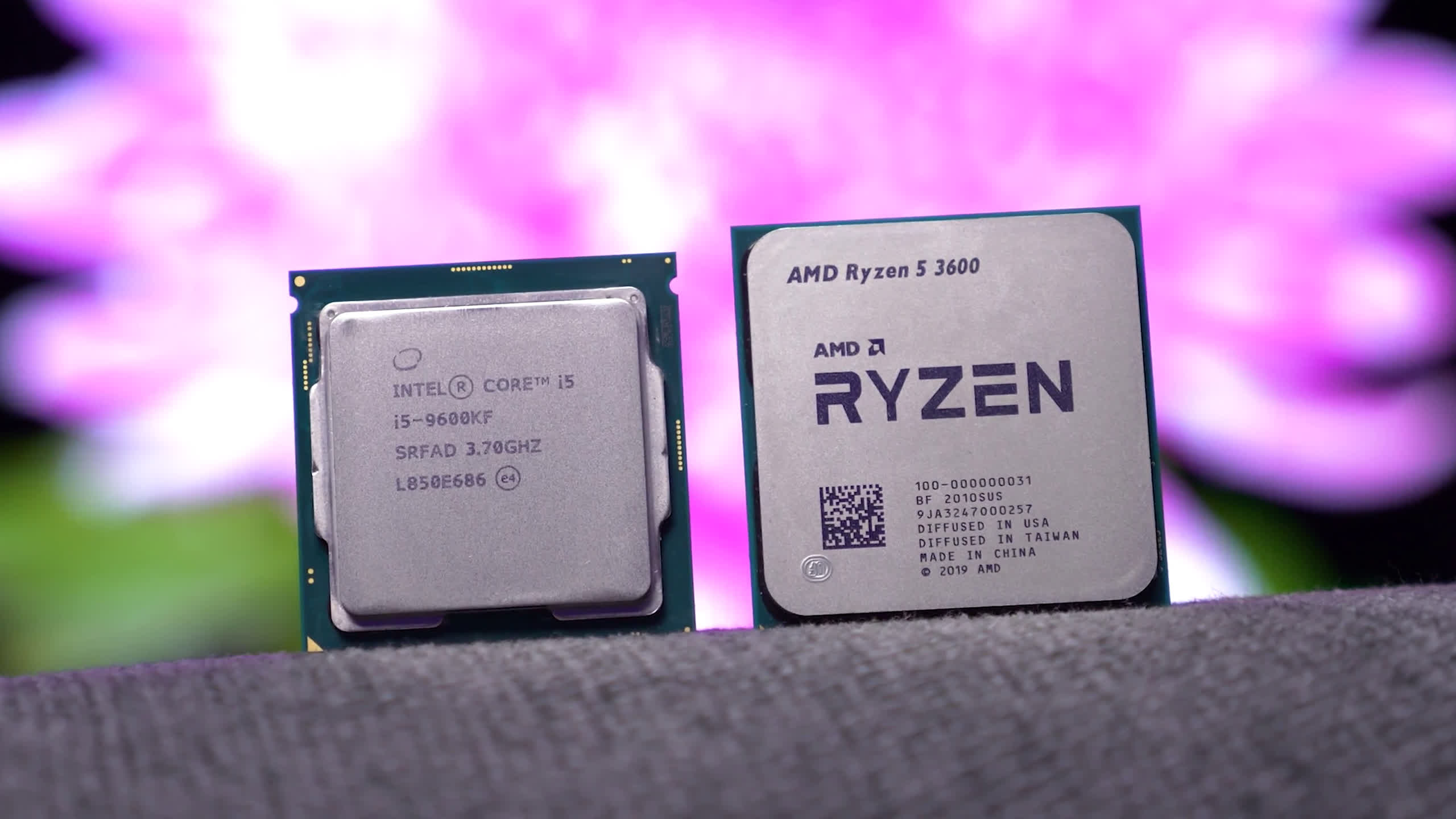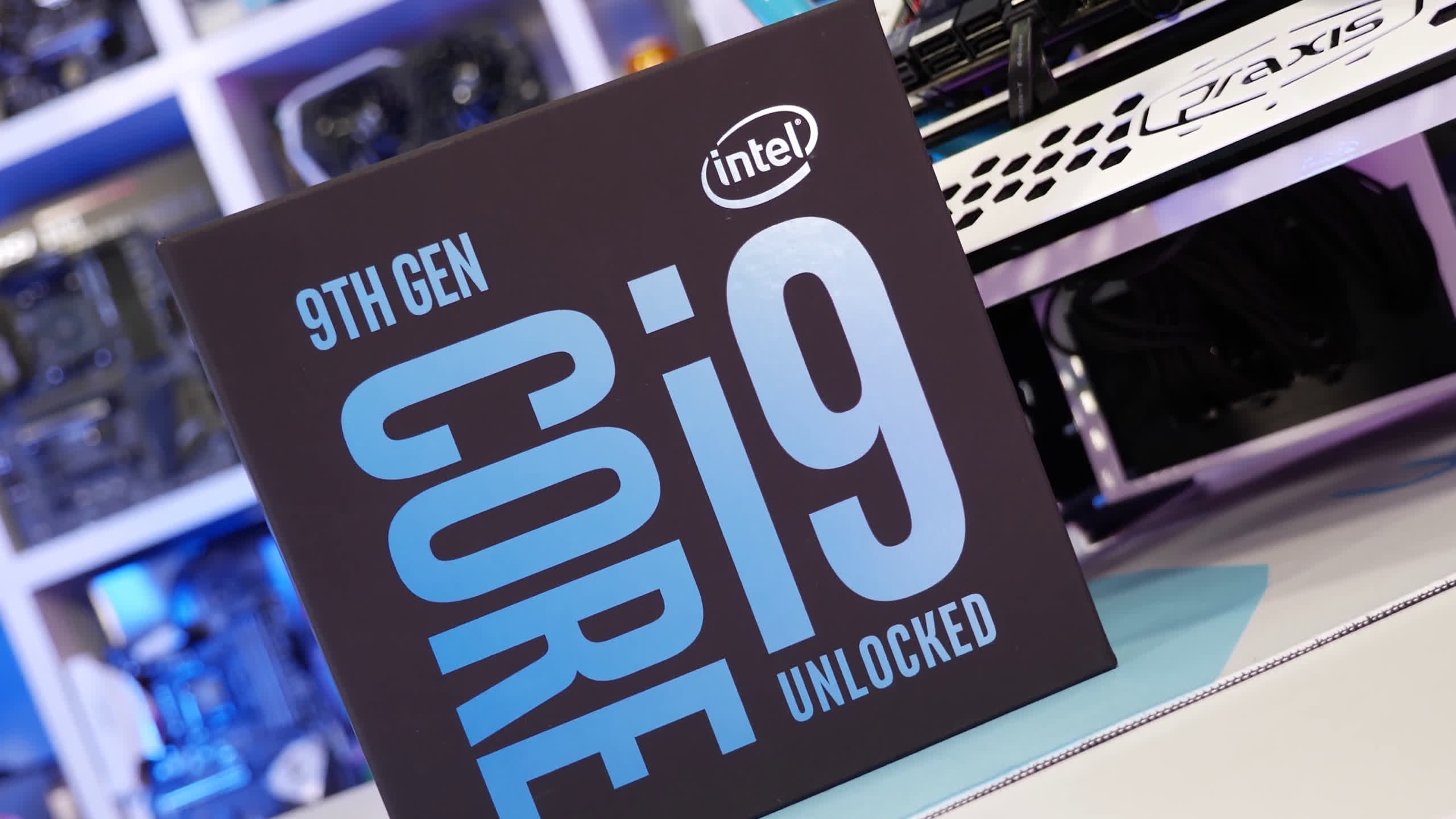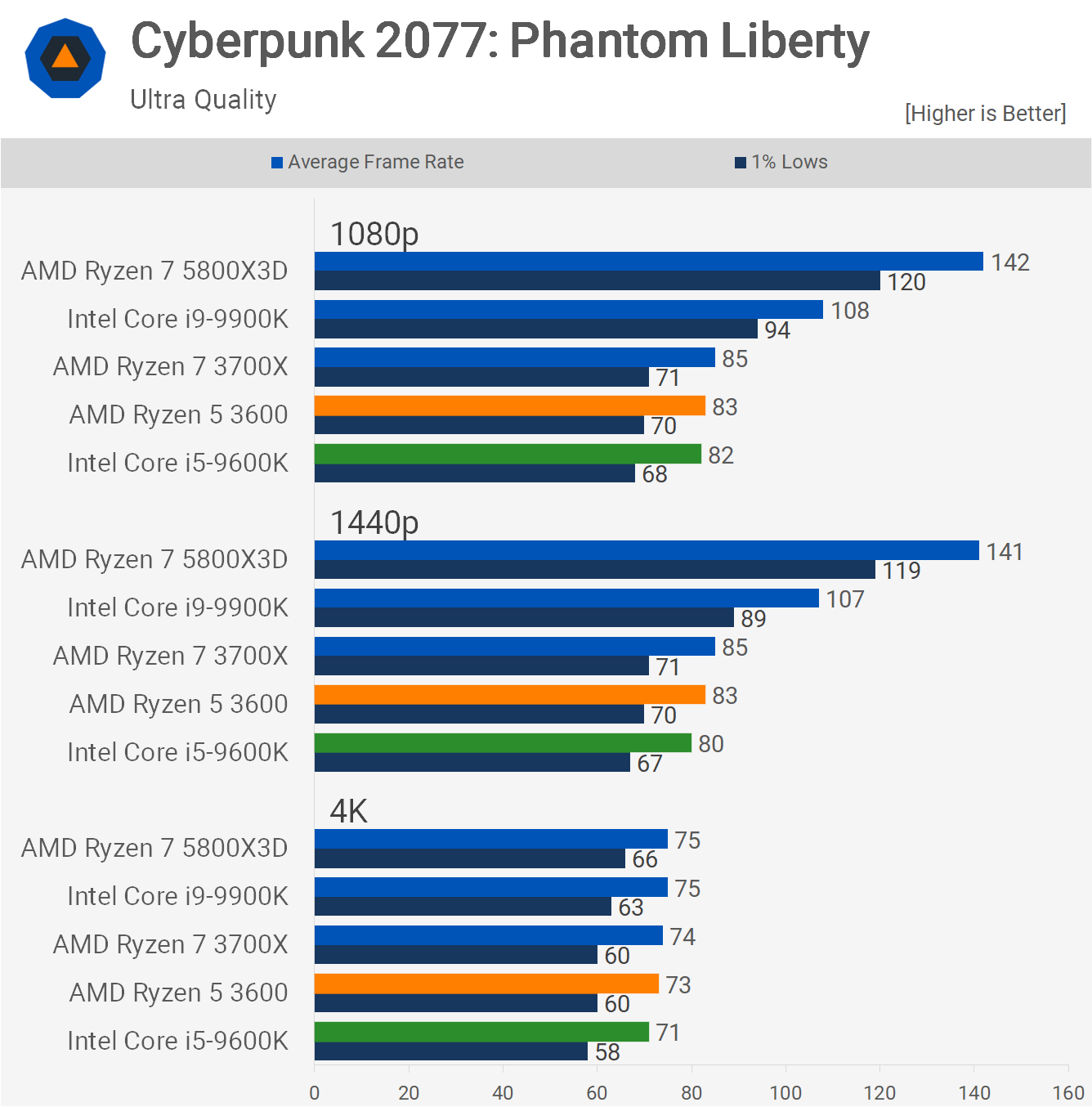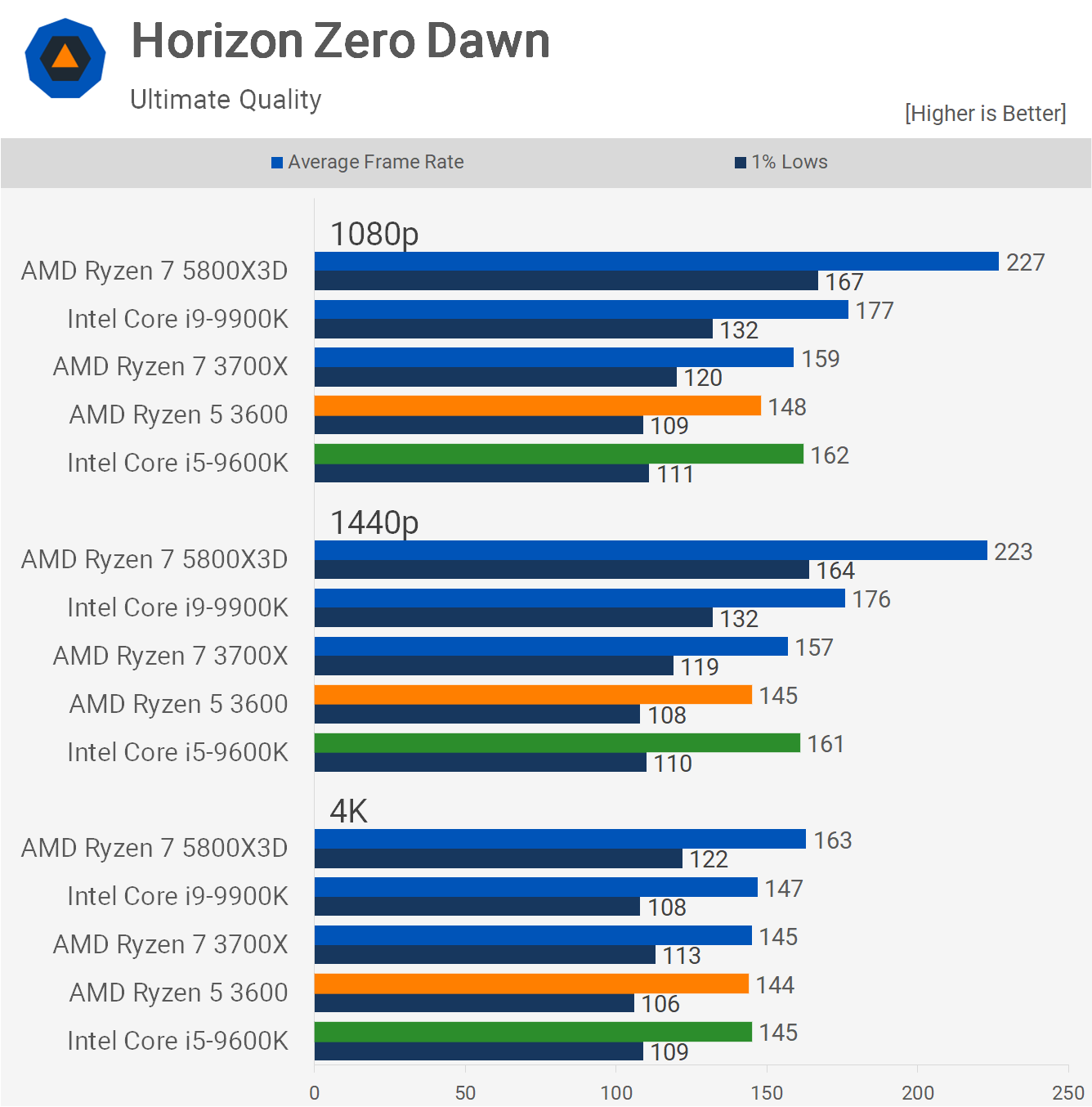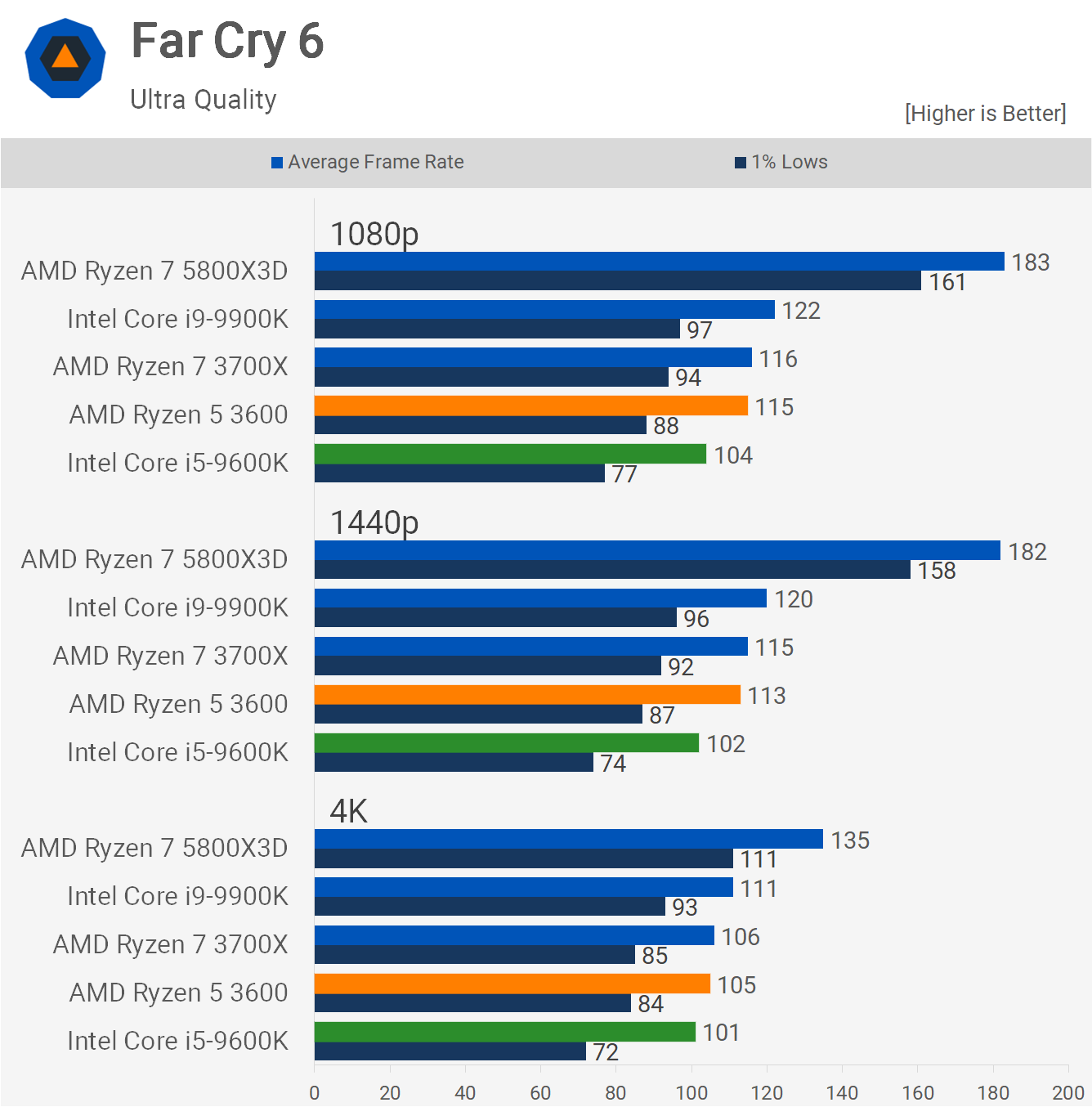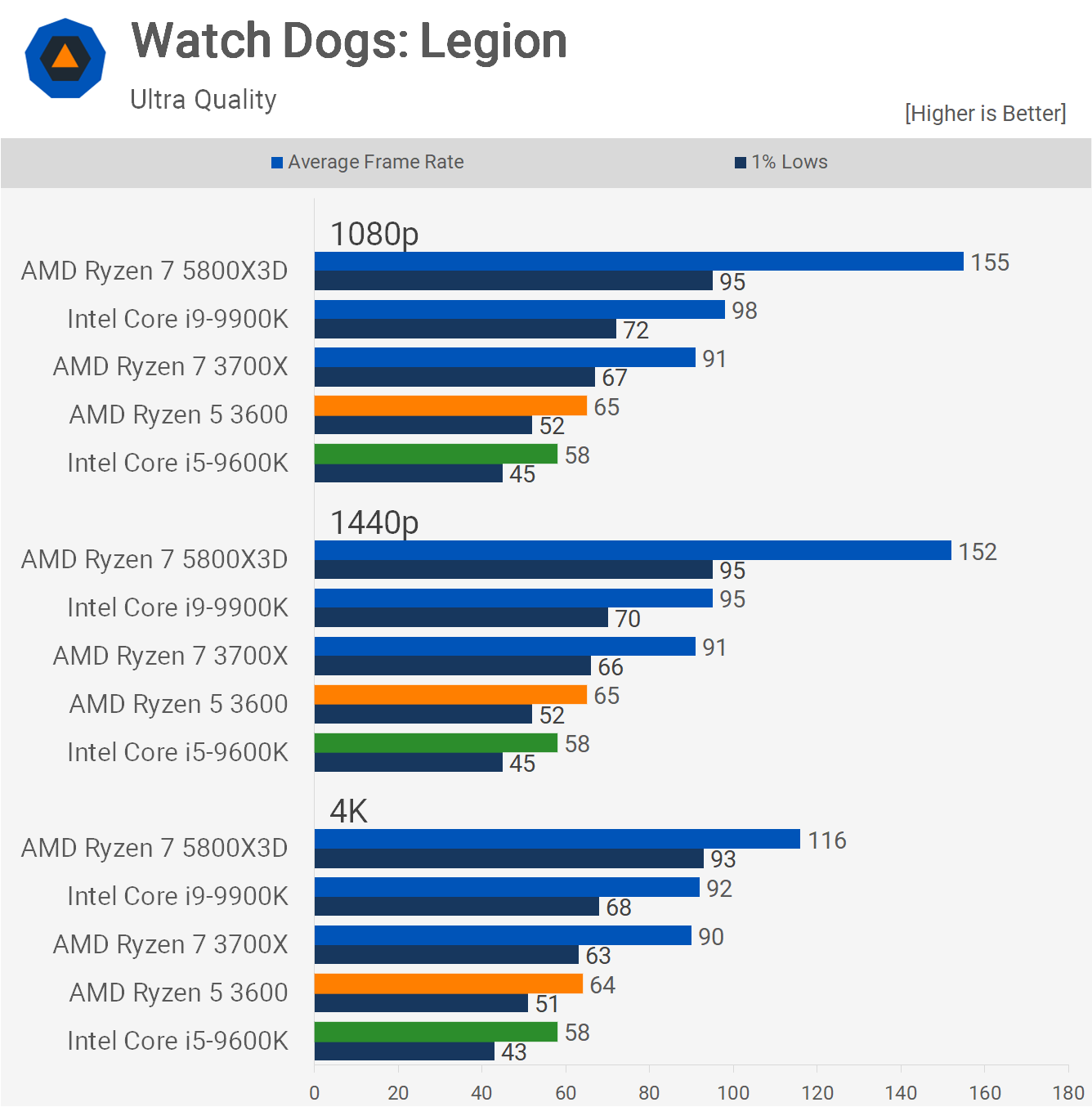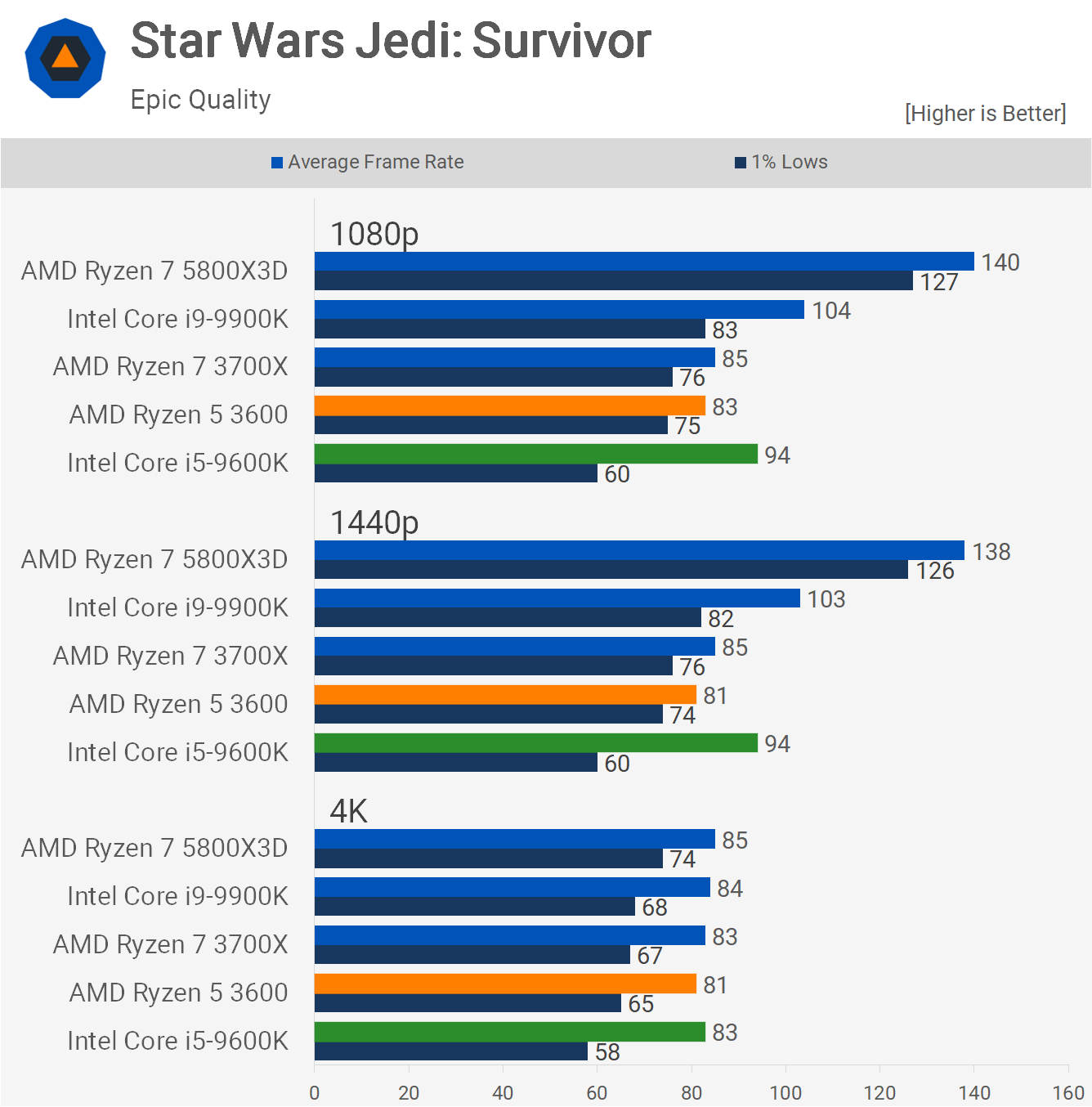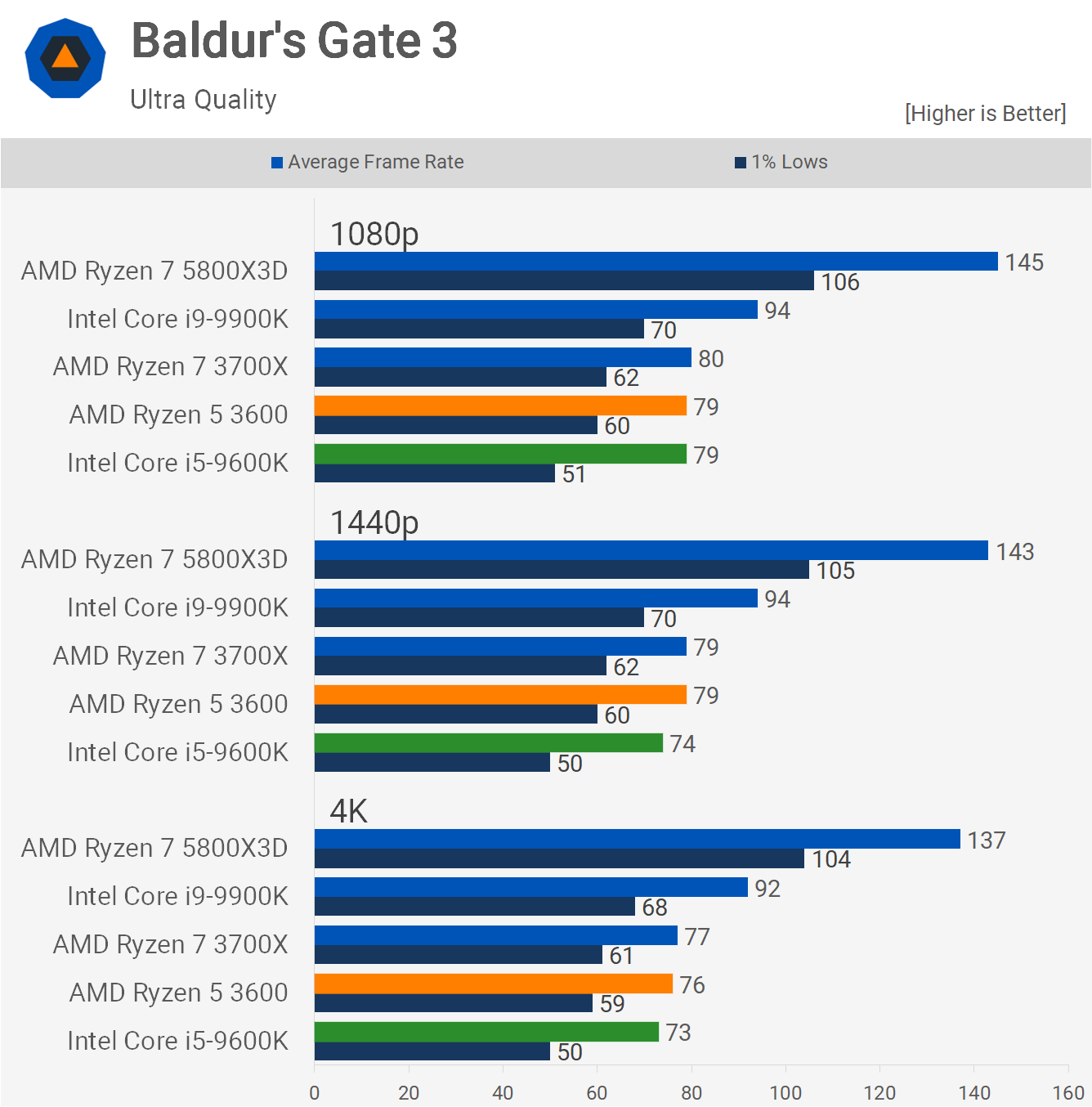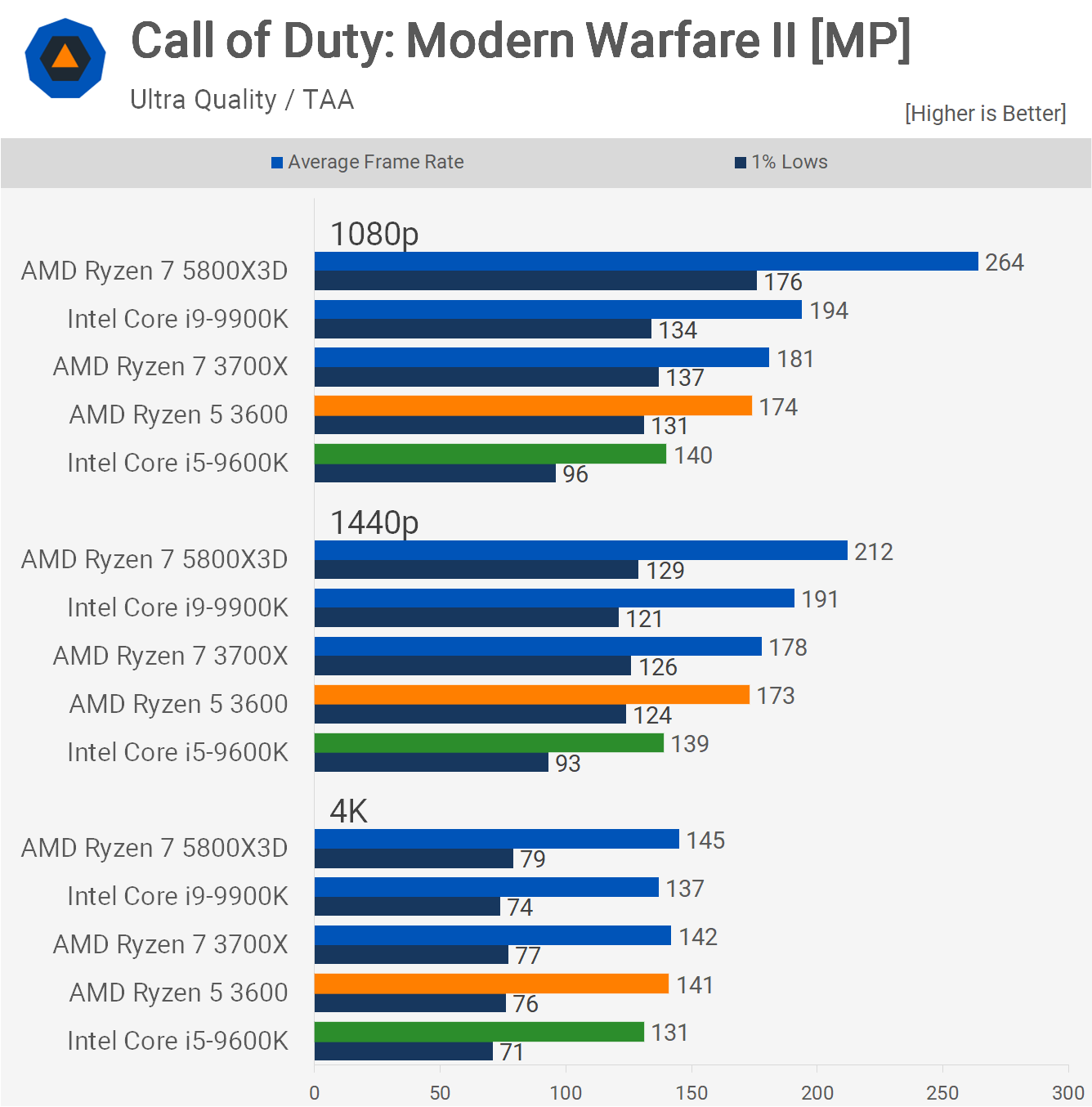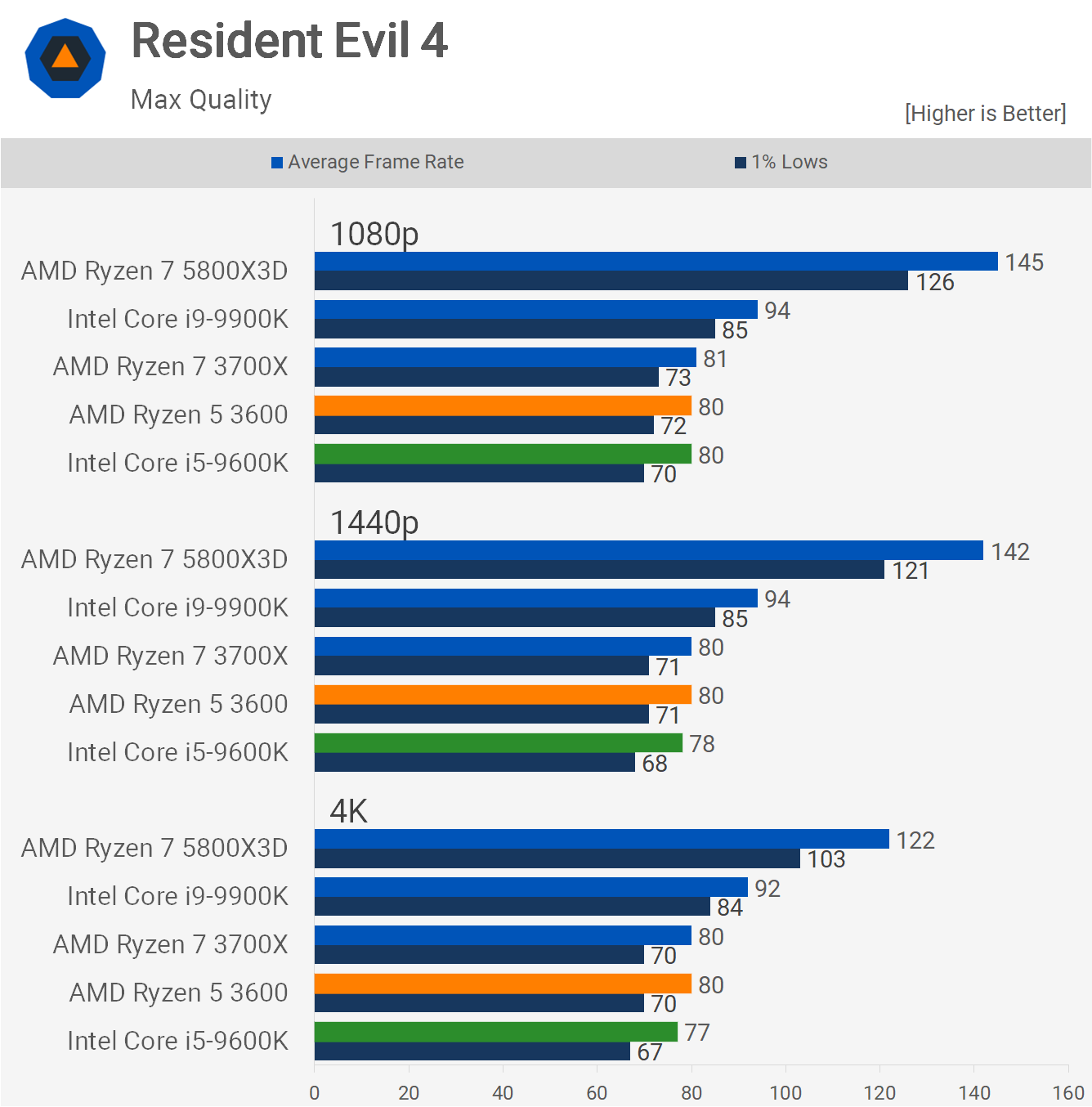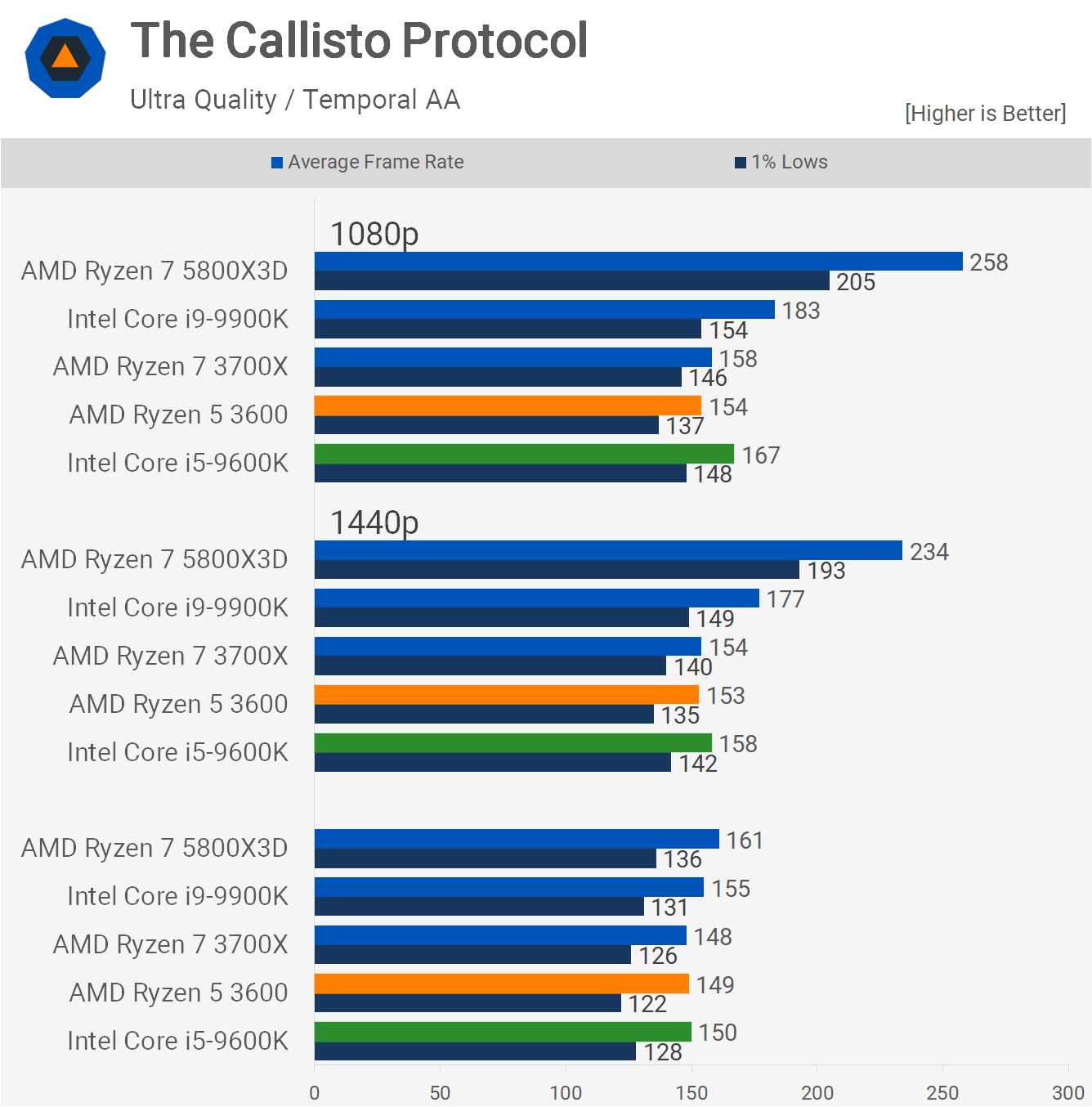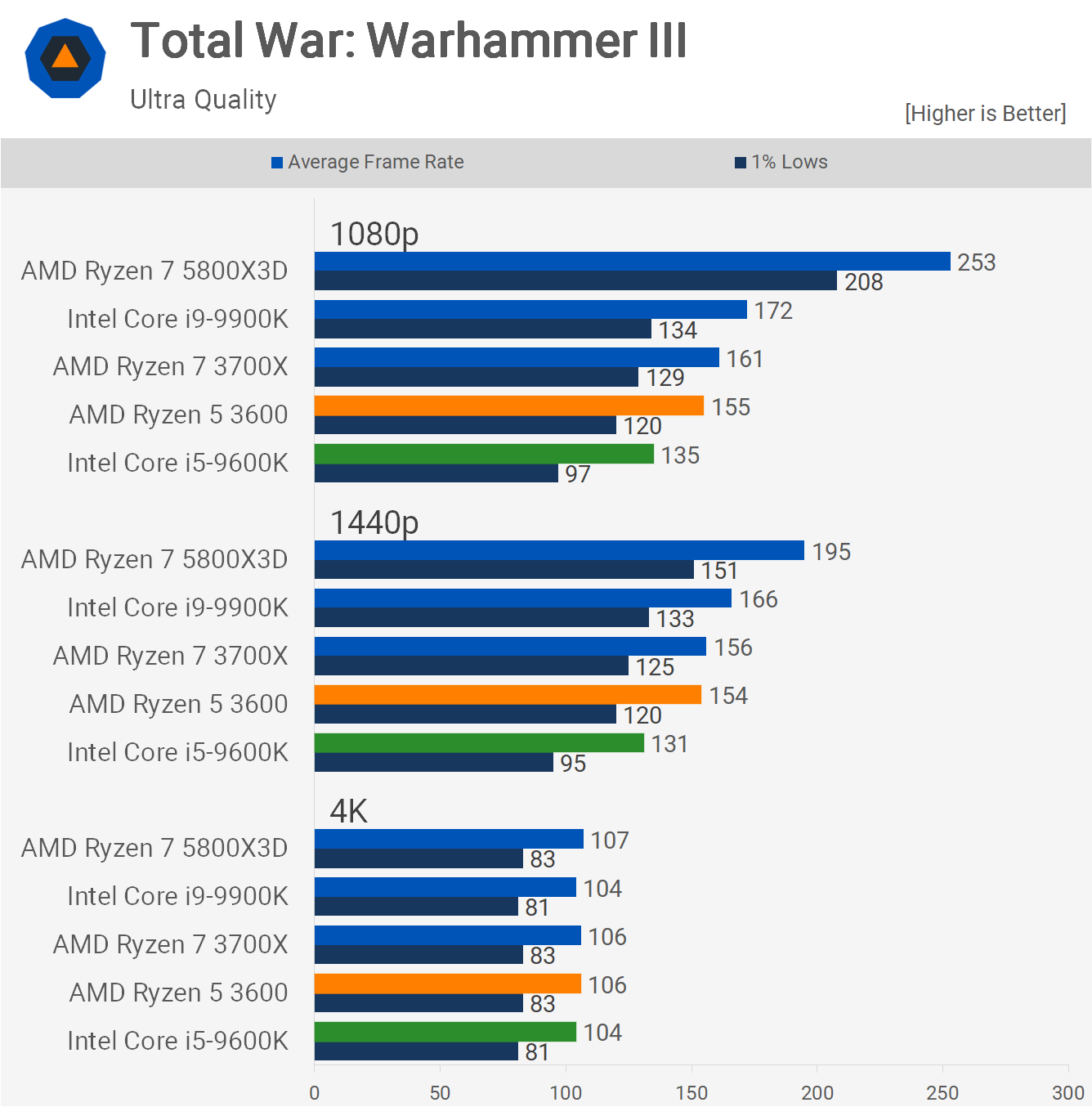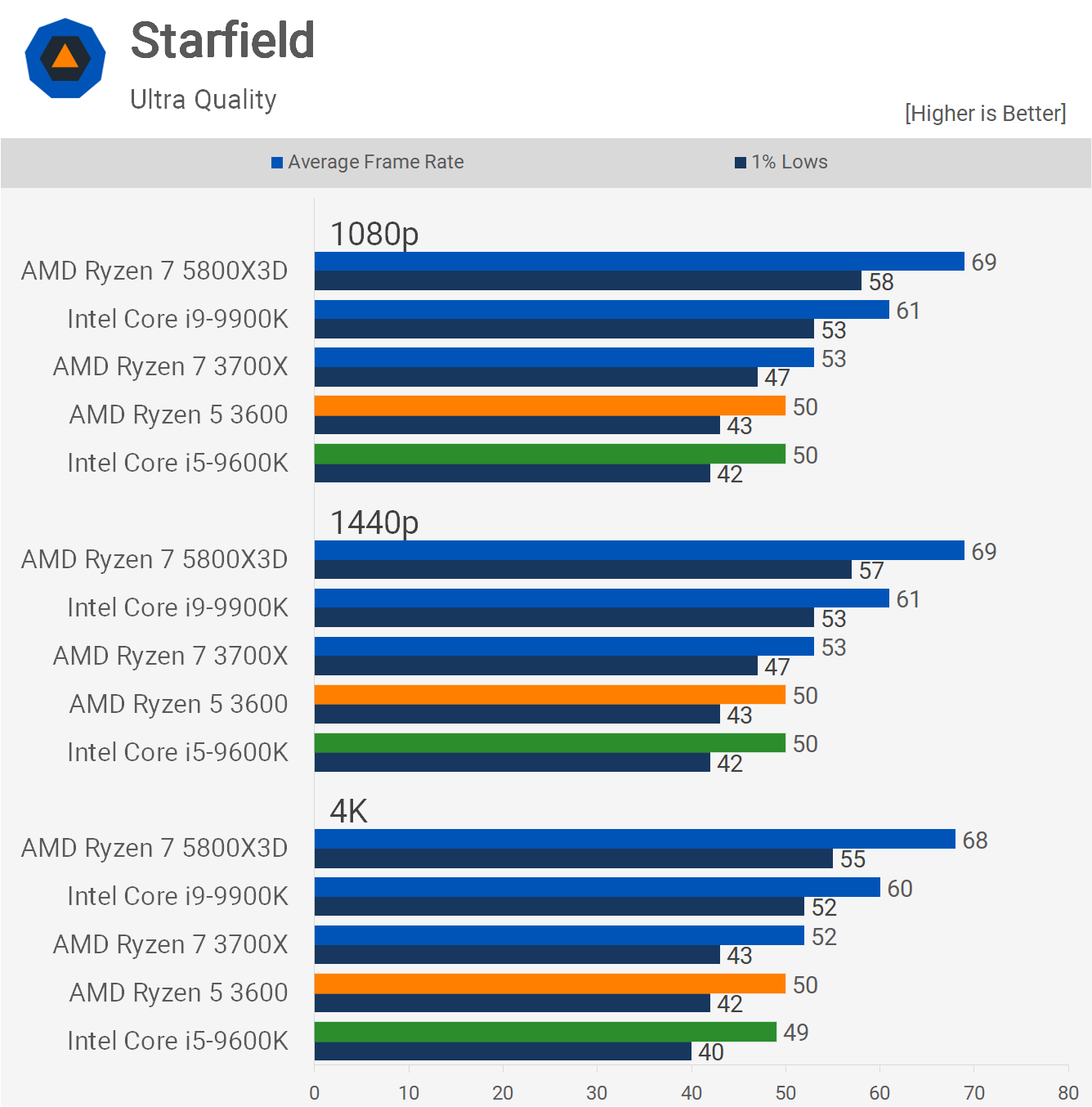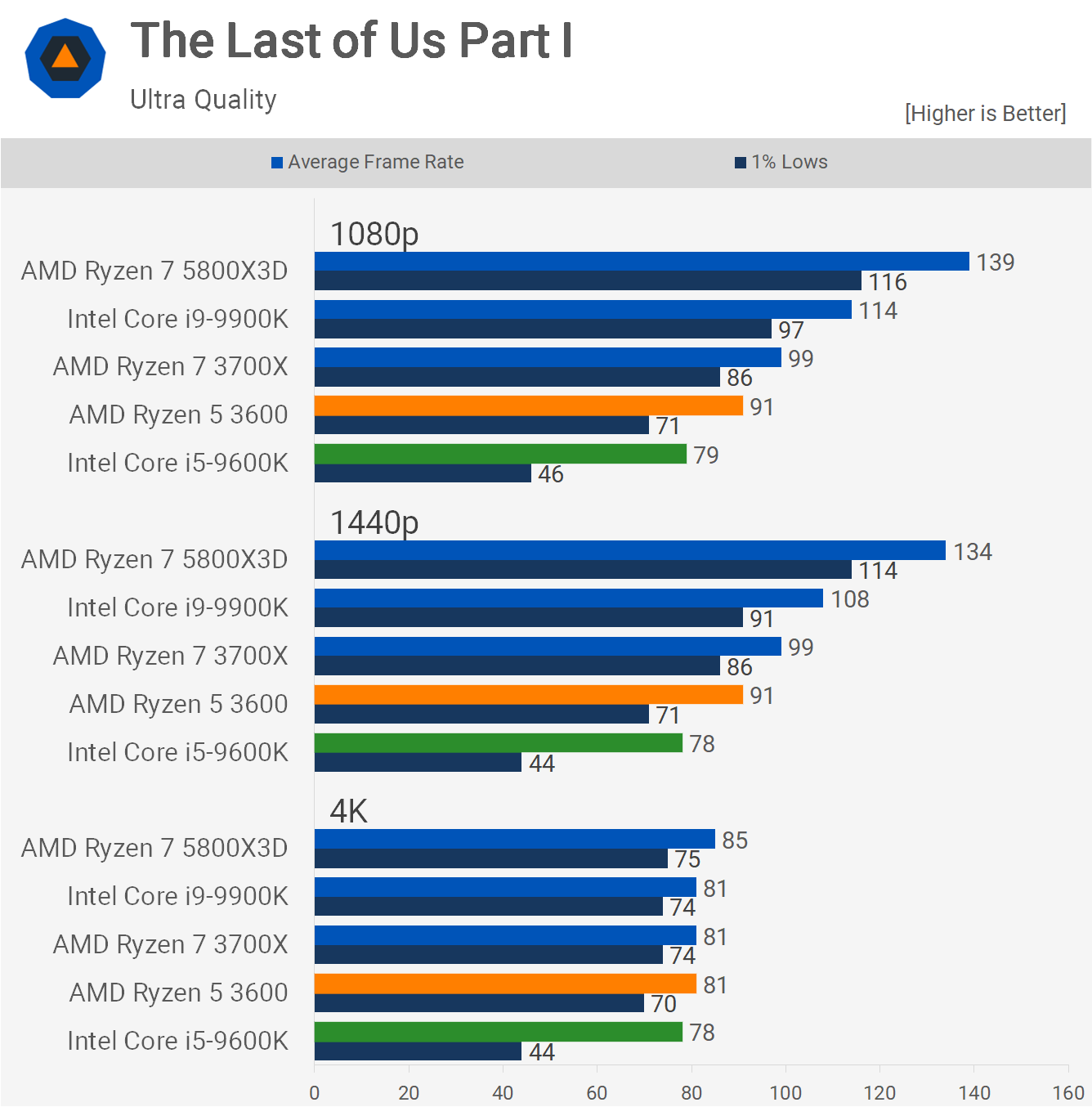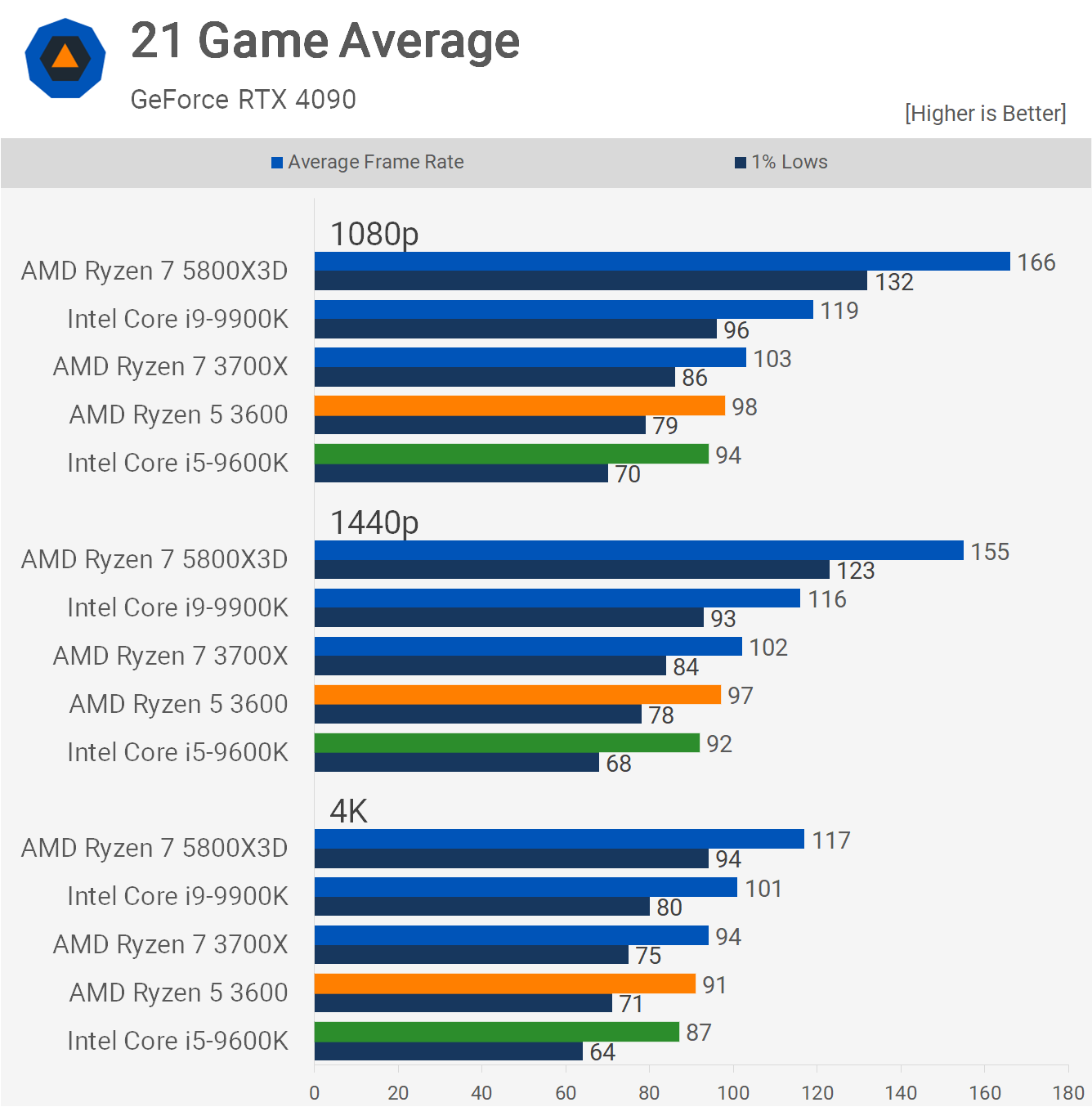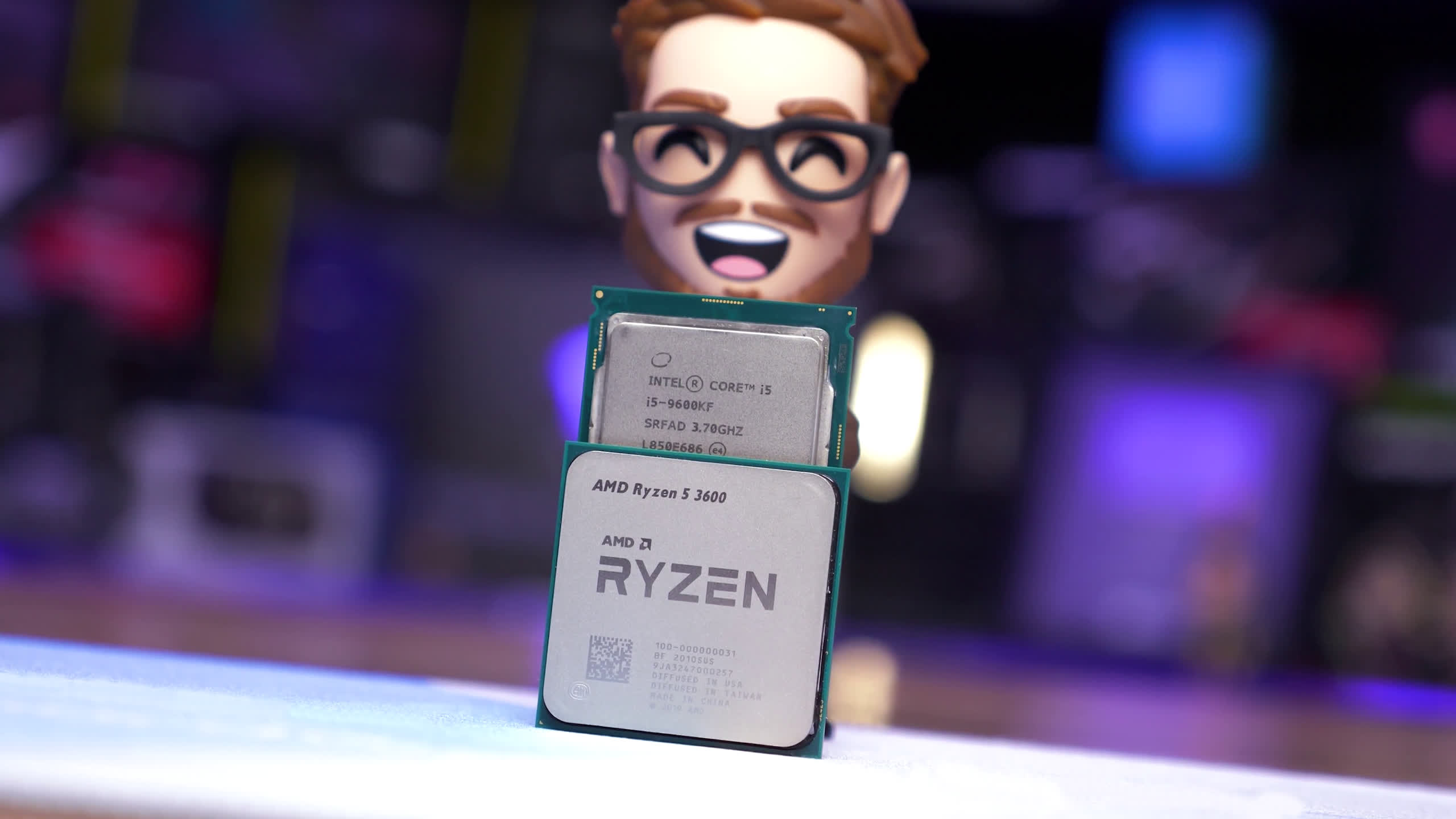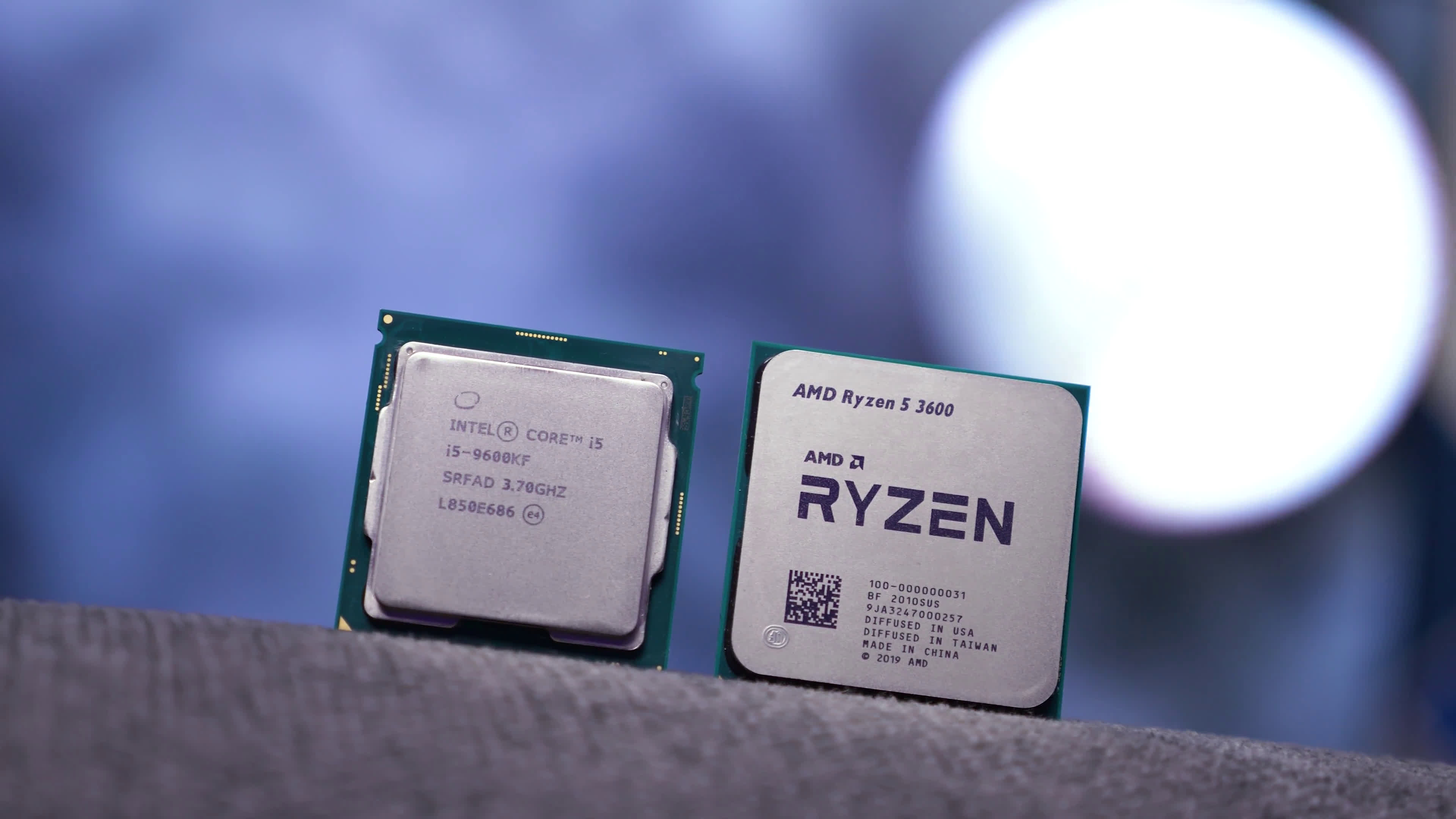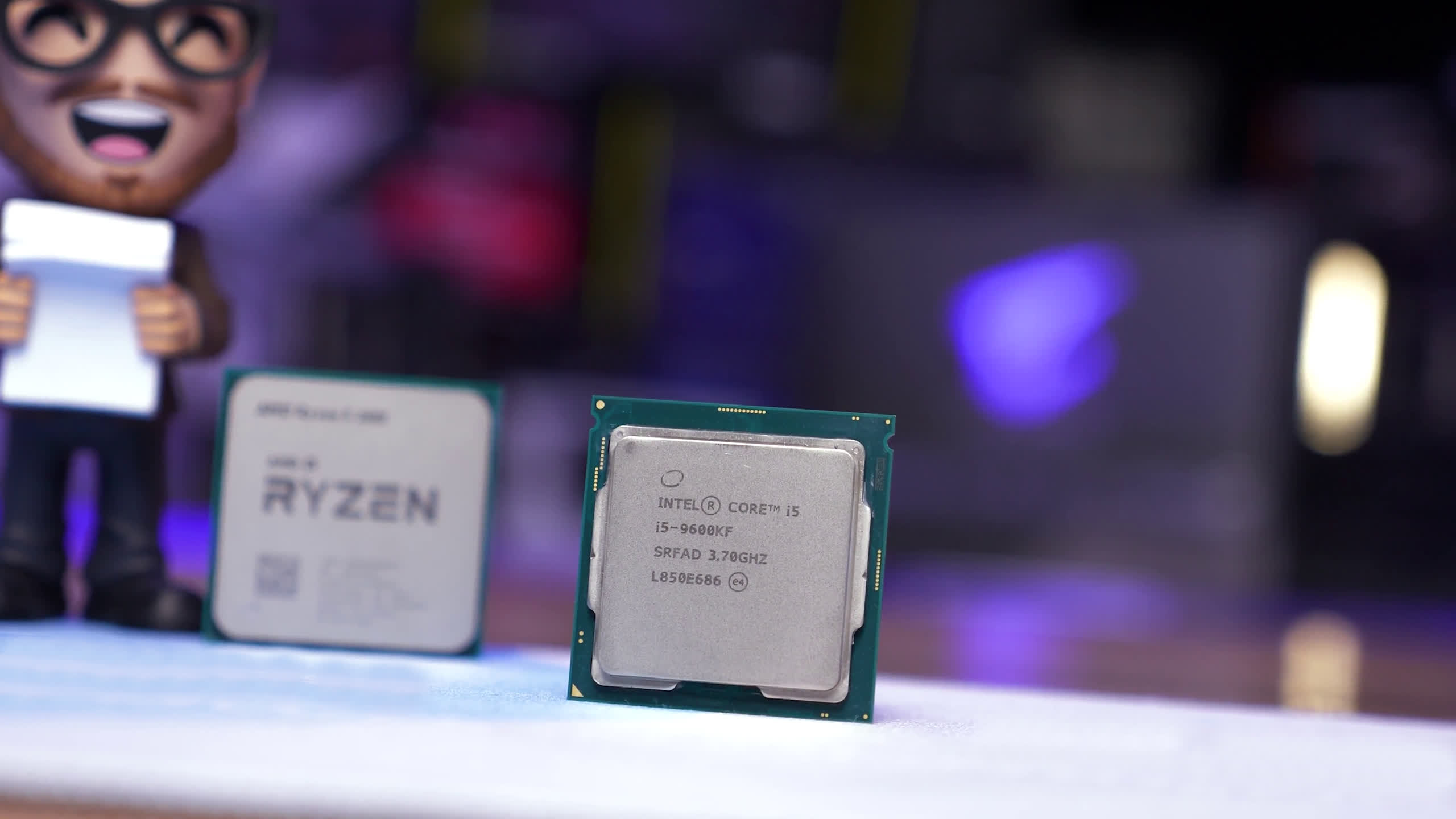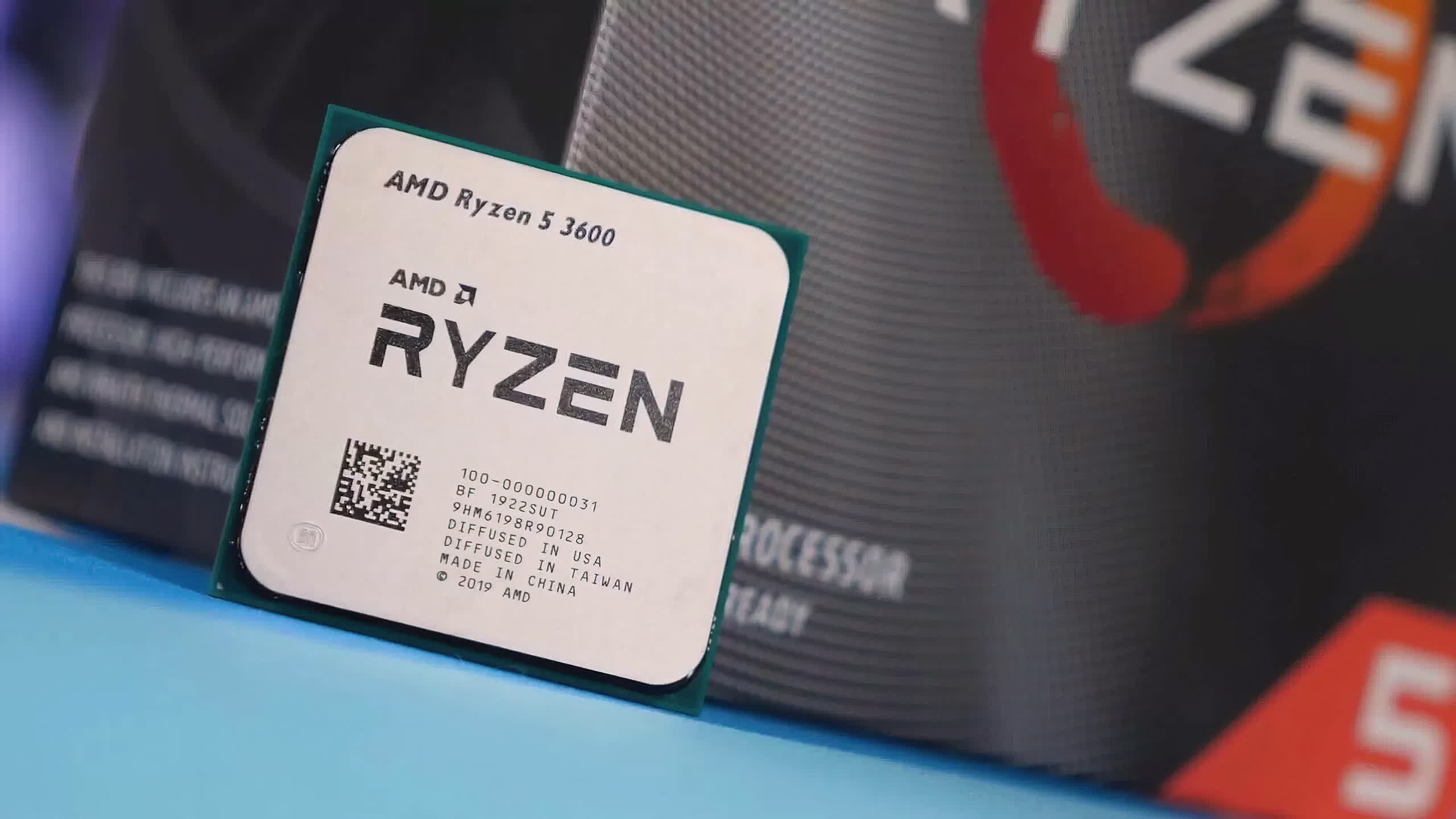Today, we're revisiting the gaming performance of two budget CPUs from years past: the Ryzen 5 3600 and Core i5-9600K. We'll not only compare how they perform in today's games but also benchmark the flagship upgrade options to determine which platform has aged the best.
Four years ago, when we benchmarked both products, the Core i5-9600K was on average 4% faster in gaming. However, it often lagged in productivity tasks as it featured only 6 cores and 6 threads. In contrast, the Ryzen 5 3600 boasts 6 cores and 12 threads, making it more capable. We expect this to significantly benefit its performance in modern games.
For testing, we're using the GeForce RTX 4090 in an effort to minimize GPU bottlenecks. However, it's worth noting that by today's standards, both the 3600 and 9600K are relatively slow, meaning similar results could be achieved with a less expensive GPU, such as the Radeon RX 6800, especially if the quality settings are slightly reduced.
Both CPUs were paired with 32GB of dual-rank DDR4-3600 CL14 memory, we've installed the latest BIOS revisions and are running Windows 11. Let's get into it…
Benchmarks
First up, we have Assassin's Creed Mirage, where the Core i5-9600K performed quite poorly with noticeably weak 1% lows. The game was still playable, despite being far from optimal, and the experience using the Ryzen 5 3600 was significantly better, with 1% lows of around 80 fps and an average frame rate of 100 fps. Although the 3600 was just 3% faster in terms of average frame rate, it was 33% faster in 1% lows, even at 4K resolution.
Next up, we have Cyberpunk 2077: Phantom Liberty. Here, the 9600K, 3600, and even 3700X all delivered very similar performance. Interestingly, while 9600K owners can upgrade to the 9900K for a 32% performance boost, 3600 owners can advance to the 5800X3D, resulting in a substantial 71% performance boost.
In Horizon Zero Dawn, the 9600K outperforms the 3600, delivering 9% better average performance, though the 1% lows are much the same. The Core i5 processor performs well in this older title.
Moving on to Far Cry 6, we find the 3600 is 11% faster than the 9600K on average, with 14% stronger 1% lows. Still, the Core i5 processor managed to deliver highly playable performance in this title. Upgrading to the 9900K gives Intel users a 17% performance boost, while moving from the 3600 to the 5800X3D results in a significant 59% uplift.
The 9600K and 3600 were neck and neck in F1 23, virtually delivering identical performance. The similar performance between the 3600 and 3700X, both featuring the same 32MB L3 cache, indicates that cache size is more crucial here than core count when comparing 6 to 8 cores. The 9900K, with almost 80% more L3 cache than the 9600K, explains the 32% performance increase at 1080p.
In Assetto Corsa Competizione, the 9600K was 11% faster than the 3600 and 18% faster in 1% lows, marking an impressive result for the Core i5. ACC, being a single-threaded game, showcases the strengths of the 9600K.
Neither the 9600K nor the 3600 are particularly impressive in Watch Dogs: Legion, a core-heavy, CPU-demanding game. However, the Ryzen 5 processor was 12% faster, averaging 65 fps at 1080p. Upgrading to the 9900K gives 9600K owners a significant 70% uplift, while 3600 owners opting for the 5800X3D can expect an astounding 140% performance improvement.
In A Plague Tale: Requiem, the 9600K and 3600 were again closely matched. The 3600's 1% lows were worse than those of the 3700X, indicating the benefit of extra cores, but overall, both processors delivered solid performance.
Star Wars Jedi: Survivor was challenging on the 9600K, with longer load times and noticeable frame drops compared to the 3600. Despite the 9600K having 13% higher average frame rates, the overall experience was inferior, with the 3600 offering 25% better 1% lows.
In Baldur's Gate 3, the 9600K also suffered from weaker 1% low performance. Although its average frame rate matched the 3600, the Ryzen 5 was 18% faster in 1% lows. Here again, upgrading from the 9600K to the 9900K resulted in an 18% performance increase, compared to the 84% uplift seen with the 5800X3D for 3600 users.
In Call of Duty: Modern Warfare II, the 9600K was significantly slower than the 3600, averaging just 140 fps. This made the Ryzen 5 processor 24% faster on average and 36% faster in 1% lows, marking a clear win for AMD.
Moving on to Resident Evil 4, we find that the 3600, 3700X, and 9600K are all very evenly matched, delivering around 80 fps on average. We also see that the 9900K offers just an 18% performance improvement over the 9600K, which isn't a significant upgrade considering the costs involved. However, the 5800X3D is astonishingly 81% faster than the 3600, presenting a substantial upgrade option on the same compatible socket.
Despite its age, Shadow of the Tomb Raider remains a core-heavy, CPU-demanding title. For testing, we avoid using the built-in benchmark as it doesn't accurately represent the CPU load seen in-game. Instead, we test in the village section, as shown in the top left corner of the graph.
Here, the 3600 is 9% faster than the 9600K, a relatively minor performance advantage. However, the potential upgrades offer significantly different results. The 9900K is 35% faster than the 9600K, a respectable improvement, but it pales in comparison to the 109% boost the 5800X3D provides over the 3600.
The Core i5 performs well in The Callisto Protocol, which isn't a particularly CPU-demanding title. It was 8% faster than the 3600 and even outperformed the 3700X. In this case, the 9600K was so efficient that upgrading to the 9900K only yields a 10% performance increase. Meanwhile, the 5800X3D was 54% faster than the Core i5.
The Ryzen 5 3600 significantly outperforms the 9600K in Warhammer III, delivering up to 15% more performance. The 9900K is only 27% faster than the 9600K, while the 5800X3D outpaces the 3600 by 63%.
Hogwarts Legacy doesn't work particularly well with any of these older processors, with performance hovering around 40 fps for the 3600, 3700X, and 9600K. Performance is similar overall, but once again, the in-socket upgrade advantage goes to AMD, as the 9900K tops out at 46 fps, whereas the 5800X3D reaches 60 fps.
In Starfield, the older CPUs don't perform exceptionally well, although it's worth noting that the 5800X3D isn't particularly effective in this title either. This data was collected before the recent update that improves performance. Here, the 9600K and 3600 were tied, each achieving 50 fps.
The Core i5-9600K struggles significantly with The Last of Us Part I, particularly with poor 1% low performance, resulting in a 54% performance advantage for the 3600 and a 15% increase in average frame rate. The frequent stuttering makes the 9600K unsuitable for this title.
In Halo Infinite, the 9600K did not encounter any performance-related issues, except for being slower than the 3600. The Ryzen 5 part provided an 8% boost to the average frame rate.
The 9600K was somewhat unstable in Hitman 3, though the overall performance was decent with generally smooth gameplay. The 3600 was 12% faster on average, and the 5800X3D offered a more significant upgrade than the 9900K.
Finally, we have Spider-Man Remastered, another game where the Ryzen 5 3600 outperforms the 9600K, this time by 12%. The upgrade paths also favor AMD, as the 9900K was 48% faster than the 9600K, a notable improvement. However, the 5800X3D surpassed the 3600 by 73%.
Performance Summary
We've reviewed the 21 games tested, and it appears that the Ryzen 5 3600 is now outperforming the Core i5-9600K. To confirm this, let's examine the 21-game average, starting with the 1080p data.
Indeed, the Ryzen 5 3600 has shifted from being 4% slower upon release to being 4% faster now. However, these figures don't fully capture the situation. At its launch, the 3600 might have been slightly slower on average, but it consistently delivered highly playable frame rates in all games without stuttering or frame pacing issues.
In contrast, the 9600K today often provides a subpar experience, marred by frame stutters and slow loading times. We were surprised by the 9600K's sluggishness in loading games and levels, a problem we didn't encounter with the Ryzen 5 3600. Therefore, the overall experience was significantly better with the Ryzen processor.
Then, there's the upgrade path, which is what initiated this series. Those who invested in the LGA 1151 platform with the 9600K have limited options if they wish to keep their motherboard. The 9900K, while offering an average of 27% more performance, is an expensive CPU. Meanwhile, for a similar investment, the 5800X3D provided an average performance increase of almost 70% over the 3600, marking a remarkable upgrade on the same socket.
Five Years Later
So there you have it, years later, the Ryzen 5 3600 has reigned supreme, offering the best performance coupled with the best upgrade path. These more affordable, lower-end CPUs demonstrate the exceptional quality of the AM4 generation of Ryzen processors. It's clear now in 2023 that AM4 outperformed LGA 1151, and parts like the R5 3600 were a better buy than the 9600K. This was apparent to us four years ago, when we said this:
This has been Intel's problem ever since AMD launched the AM4 platform complete with a slew of Ryzen processors. Not only have they supported 2, 4, 6, 8 and now 12-core processors, all on the same socket, but they've managed to do so across three CPU generations. This makes recommending Intel's 8th and 9th generation LGA1151 platform difficult in 2019. Short of building a high-end Core i7-9700K or i9-9900K rig, we can't think of a scenario where it makes full sense.
The 9400F is a perfect example of this limitation. Future upgrade options are slim, and in a year or two, users will likely need more than 6 threads. In a couple of years, second-hand pricing for 8700K, 9700K, and 9900K processors will be horrible, as everyone invested in the platform will be seeking a quick and easy upgrade.
With very limited upgrade options and no future support for upcoming generations, recommending the current Intel LGA1151 platform is very difficult.
The value of the Ryzen 5 range was remarkable, with parts like the 3600 having sold for as little as $95. In contrast, the 9600K never dropped below $200, though the 9600KF briefly reached ~$175. However, at that time, the 3600 was selling for just $95, making it the superior choice and dominating our best value all-round pick for years.
With just 6 cores and 6 threads, along with a relatively small 9 MB L3 cache, the 9600K aged quite poorly. After 5 years, it's likely time for an upgrade, and that means building what will be an almost entirely new PC. The 9900K, averaging only 27% faster, is not a sufficient upgrade and is also not cost-effective.
The 5800X3D offers approximately 40% more performance than the 9900K, making it a significantly better upgrade and allowing users to extend the life of their AM4 hardware.
This highlights why platform longevity is crucial, and it's something all PC users should advocate for with AMD, while also urging Intel to provide better upgrade paths, particularly for lower-end hardware where the lack of an actual upgrade path hurts the most.
The lack of platform commitment is likely impacting Intel's retail CPU sales, a reality they don't seem to have woken up to. If AMD can replicate AM4's success with AM5, it will be challenging to recommend Intel CPUs in the coming years. We hope Intel recognizes this and that AMD continues its success with AM5. It's uncertain which outcome is more likely.
